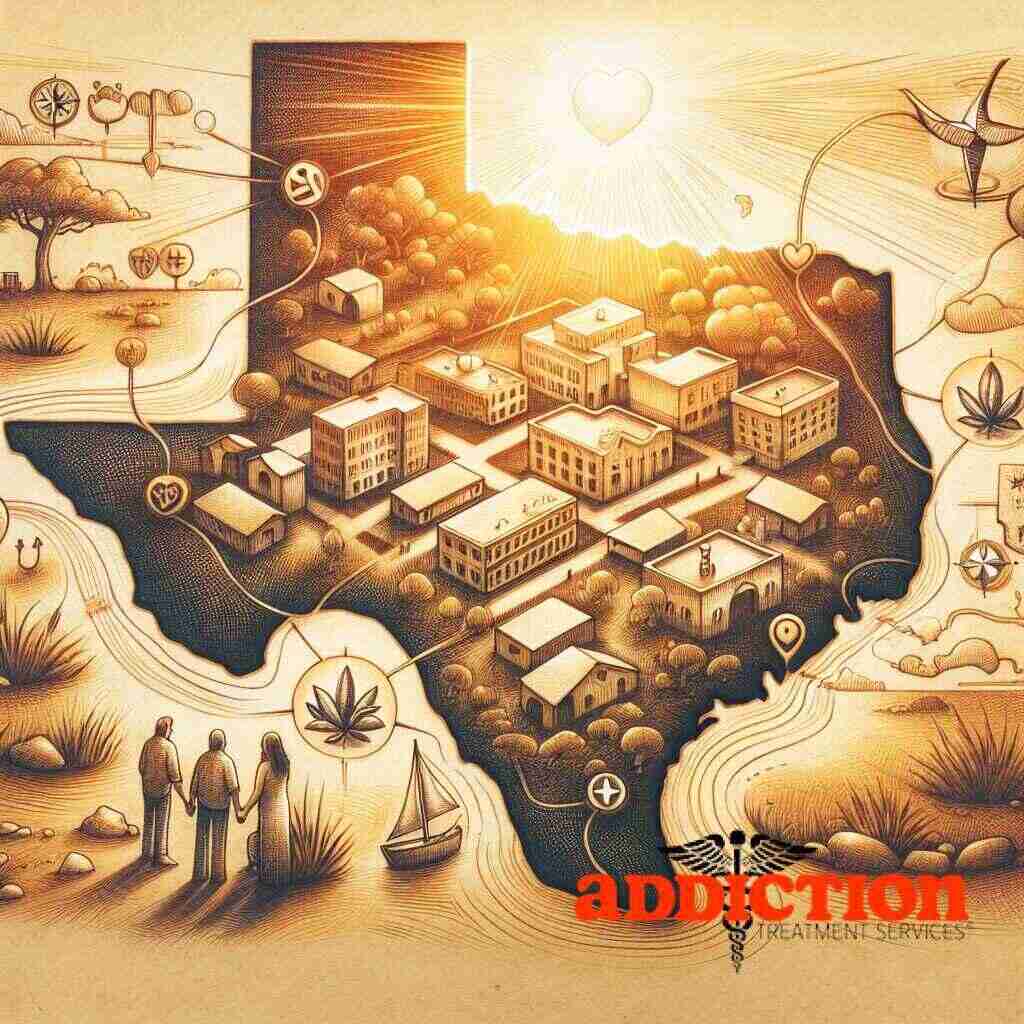 Posted On: 03/12/2024
Posted On: 03/12/2024Navigating the Landscape of Addiction Recovery in Texas
Understanding Substance Use Disorders in the Lone Star State
Substance use disorders (SUDs) impact countless lives across Texas, a state known for its vast landscapes and diverse population. In cities and rural areas alike, individuals and families face the challenges posed by addiction, whether to alcohol, prescription medications, or illegal drugs. Recognizing the signs of substance use disorders is the first step towards healing, involving a complex interplay of genetic, environmental, and psychological factors. Texas, mirroring national trends, has seen varying rates of substance abuse, underscoring the need for accessible and effective treatment options. Comprehensive outpatient services in Texas aim to address these needs, offering tailored treatment that supports individuals in their recovery journey while allowing them to maintain their daily responsibilities.
The Importance of Choosing the Right Outpatient Program
Selecting the appropriate outpatient program is pivotal in the recovery process for anyone struggling with substance use disorder in Texas. The state offers a wide array of outpatient programs, each designed to meet different needs and stages of recovery. When considering Texas addiction treatment, it’s essential to evaluate factors such as the program’s focus, the types of therapy offered, the qualifications of the staff, and the level of individualized care provided. Effective outpatient treatment services emphasize evidence-based therapies, holistic care, and personalized treatment plans to address not only the substance use disorder but also any co-occurring mental health conditions. By choosing the right program, individuals can significantly enhance their chances of long-term recovery and overall well-being.
Overview of Texas Addiction Treatment Regulatory Environment
Understanding the regulatory environment of addiction treatment in Texas is crucial for both treatment providers and those seeking care. The state has established regulations and licensing requirements to ensure the quality and safety of addiction treatment services. These regulations are designed to protect patients and provide a framework for the delivery of comprehensive care. The Texas Health and Human Services Commission (HHSC) plays a pivotal role in overseeing these standards, with a focus on promoting evidence-based practices and ensuring the rights of individuals seeking treatment are upheld. Navigating the regulatory landscape can provide insight into the commitment of Texas to maintaining high-quality addiction treatment services, reflecting an ongoing effort to support recovery and reduce the impact of substance use disorders within the community.
Outpatient Treatment Services Explained
What is Outpatient Treatment?
Outpatient treatment, a flexible and widely utilized method for addressing substance use disorders and mental health conditions, allows individuals to receive therapy and support while continuing with their daily lives. Unlike inpatient or residential treatment, where individuals reside at a facility, outpatient care permits participants to live at home, thereby balancing treatment with personal, professional, or educational commitments. This form of treatment often includes a combination of individual therapy, group therapy, educational workshops, and sometimes medication management. It is designed to provide continuity of care and support recovery without the need for a prolonged stay away from one’s community and support network. Outpatient treatment is an effective option for those with a strong support system, stable living conditions, and a moderate level of addiction severity.
Types of Outpatient Programs Available in Texas
Texas offers a multitude of outpatient programs catered to the diverse needs of individuals struggling with substance use disorders. These vary in intensity and structure, ensuring a suitable option for various stages of recovery. Standard outpatient programs typically involve a few hours of treatment per week, focusing on therapy, education, and relapse prevention. The intensive outpatient program Texas (IOP) offers a more robust structure, requiring participants to attend multiple sessions per week, each lasting several hours. IOPs are ideal for those needing more support than a standard outpatient service but who do not require residential care. Moreover, Texas provides specialized outpatient services targeting specific demographics, such as adolescents, women, or veterans, ensuring tailored support that considers unique challenges faced by different groups.
Comparing Outpatient with Residential Treatment Options
Understanding the distinction between outpatient and residential treatment options is crucial for selecting the most effective path to recovery. Residential or inpatient treatment involves living at a dedicated facility, offering 24-hour care, structured programs, and an environment isolated from everyday triggers. This intensive level of care is typically recommended for individuals with severe addiction, a history of relapse, or co-occurring mental health disorders. On the other hand, outpatient treatment offers greater flexibility, allowing individuals to remain in their home environment and continue with work or education. Though less immersive, outpatient care emphasizes independence and the application of coping strategies in real-world settings. Deciding between these options depends on the individual’s needs, addiction severity, personal responsibilities, and the presence of a supportive home environment.
Key Components of Outpatient Care in Texas
The Role of Behavioral Health Services
Behavioral health is a cornerstone of comprehensive outpatient care for substance use disorders in Texas. Texas behavioral health services play a critical role in supporting individuals through their recovery journey by addressing not just the physical aspects of addiction, but also the psychological and social factors. These services offer a range of therapeutic interventions, including individual psychotherapy, group therapy sessions, family counseling, and cognitive-behavioral therapies. The aim is to equip individuals with coping mechanisms and strategies to handle stressors and triggers, thereby fostering resilience and reducing the likelihood of relapse. Behavioral health services also emphasize the importance of a personalized treatment plan that caters to the unique needs of each person, ensuring a more effective and meaningful recovery process.
Effective communication and a supportive therapist-patient relationship are fundamental to the success of these services. By creating a safe and trusting environment, therapists can encourage open discussions about substance abuse, mental health issues, and any co-occurring disorders. This holistic approach to outpatient care recognizes the complex interplay between substance use and mental health, advocating for integrated treatment strategies that address all aspects of an individual’s well-being.
Medication-Assisted Treatment: A Closer Look
Medication-assisted treatment (MAT) represents a crucial component of outpatient services in Texas, particularly for those battling opioid addiction and alcohol use disorders. MAT combines FDA-approved medications with counseling and behavioral therapies to treat substance use disorders. Medications such as buprenorphine, methadone, and naltrexone are commonly used to manage withdrawal symptoms, reduce cravings, and restore normal brain function. Texas medication-assisted treatment programs are designed to provide a comprehensive and integrated approach to addiction recovery, emphasizing the importance of medication as a tool to support overall treatment goals.
The effectiveness of MAT in improving patient survival rates, increasing retention in treatment, and reducing the risk of relapse has been well-documented. It addresses not only the physical aspects of addiction but also assists individuals in engaging more fully in the therapeutic aspects of outpatient care. Despite its proven benefits, MAT is often underutilized due to stigmatization and lack of understanding about its role in the recovery process. Education and awareness efforts are crucial to dispelling myths associated with MAT and promoting its acceptance as a vital component of addiction treatment.
Incorporating Mental Health Services in Addiction Treatment
The integration of mental health services into outpatient addiction treatment is essential for addressing the dual diagnosis of substance use disorders and mental health conditions. Many individuals struggling with addiction also face challenges with mental health issues such as depression, anxiety, bipolar disorder, or post-traumatic stress disorder (PTSD). Incorporating mental health services into the treatment plan ensures that these co-occurring disorders are treated concurrently with the substance use disorder. By providing access to psychiatric evaluations, medication management, and targeted psychotherapies, outpatient programs in Texas can offer a more holistic and effective approach to recovery.
The inclusion of mental health services in addiction treatment acknowledges the complex relationship between mental health and substance abuse. It recognizes that addressing one issue without treating the other can undermine the recovery process and increase the risk of relapse. Integrated treatment models that combine psychotherapy, support groups, and psychiatric care with traditional addiction treatment modalities have shown significant success in improving outcomes for individuals with dual diagnoses. This integrated approach fosters a comprehensive understanding of the individual’s needs, paving the way for a more sustainable and successful recovery journey.
Intensive Outpatient Programs (IOP) in Texas

Understanding the Structure of IOP
Intensive Outpatient Programs (IOP) in Texas offer a structured and supportive environment tailored for individuals transitioning from higher levels of care such as inpatient treatment or for those whose conditions do not require full-time supervision. The core structure of IOP involves multiple therapy sessions weekly, which may run for several hours per day, providing a balanced approach that allows participants to maintain their daily routines, such as work or school, while receiving comprehensive treatment. Group therapy is a predominant component, supplemented by individual counseling sessions, educational workshops on substance misuse, and skill-building sessions for relapse prevention. The goal of IOP is to equip individuals with the necessary tools and coping mechanisms to manage the challenges of recovery in the context of their everyday lives.
Criteria for Joining an Intensive Outpatient Program
Eligibility for an Intensive Outpatient Program in Texas typically requires a clinical assessment to determine the appropriate level of care. Criteria for joining an IOP may include a stable living situation, a lower risk of withdrawal that doesn’t require medical detoxification, and a commitment to attend all scheduled therapy sessions. Candidates are often those who do not pose a significant risk to themselves or others and have a support system in place. It’s designed for individuals who are motivated to recover but need the flexibility to maintain their obligations outside of treatment. The assessment also considers potential co-occurring mental health conditions, as treating both the substance use disorder and any mental health issues concurrently is critical for effective recovery.
Benefits of Intensive Outpatient Programs for Substance Abuse
Participating in an Intensive Outpatient Program for substance abuse in Texas provides numerous benefits tailored to support long-term recovery. One of the primary advantages is the ability to integrate the learned coping strategies and relapse prevention techniques in real-world settings, enhancing the practical application of treatment components. IOPs also foster a sense of community and peer support, as individuals navigate their recovery journeys together, sharing experiences and building a network of support that can extend beyond the program’s duration.
Moreover, IOPs afford a level of discretion and normalcy, allowing individuals to continue with their daily lives without the stigma that might be associated with inpatient care. Participants have the opportunity to remain close to family and friends, an aspect that is particularly beneficial for those who draw significant support from their personal relationships.
Specialized Outpatient Services for Substance Misuse
Outpatient Programs for Specific Substance Use Disorders
Texas is at the forefront of developing specialized outpatient services tailored to the nuances of specific substance use disorders. Understanding that addiction affects individuals differently depending on the substance involved, Texas treatment centers have evolved to offer focused care for a range of substances, including opioids, methamphetamines, alcohol, and prescription drugs. Each program is designed to address the unique withdrawal symptoms, psychological effects, and social challenges associated with its respective substance. For example, opioid outpatient programs may include medication-assisted treatment to ease withdrawal symptoms and reduce cravings, while alcohol-related services might focus more on cognitive-behavioral therapy and family counseling to address the broader impact of alcohol abuse. These focused programs ensure a more targeted and effective approach to recovery, increasing the chances of long-term success.
Early Intervention Services in Texas: A Preventative Approach
The significance of early intervention in the landscape of addiction treatment cannot be overstated. Recognizing the early signs of substance misuse and taking prompt action to address them can prevent the escalation of substance use into more severe disorders. Texas offers a variety of early intervention services tailored to individuals who are at risk of developing substance use disorders but may not yet have fully developed an addiction. These programs focus on education, awareness, and the development of coping strategies to manage stress and potential triggers. Engaging individuals at this crucial stage fosters a deeper understanding of the risks associated with substance use and equips them with the tools necessary to navigate life without depending on substances. By prioritizing prevention and early action, Texas is working to reduce the overall incidence of addiction within the community.
Youth and Adolescent Substance Abuse Counseling
Recognizing the unique challenges faced by young people in the realm of substance misuse, Texas has dedicated resources to develop outpatient services specifically for youth and adolescents. These programs acknowledge the different factors that contribute to substance use among younger populations, such as peer pressure, family dynamics, and the stress associated with adolescence. Substance abuse counseling for this demographic is tailored to be age-appropriate and engaging, employing a mix of individual counseling, group sessions, and family involvement to create a holistic support system. Counselors specialize in communicating effectively with young people, establishing trust, and providing a safe space for them to open up about their experiences with substances. Moreover, these programs often incorporate elements of life skills training, helping youth to build resilience, make healthy choices, and envision a positive future free from substance use. By addressing substance misuse early and in an age-appropriate manner, Texas is investing in the well-being of its younger residents, offering them a path to recovery that respects their unique needs and potential for growth.
Family Involvement and Support Services in Outpatient Care
The Importance of Family Involvement in the Recovery Process
Family involvement plays an essential role in the recovery process from substance use disorders in Texas. When families actively participate in treatment, individuals in recovery can experience a more supportive environment that contributes to more sustainable outcomes. Family members, by becoming involved in the recovery journey, gain a comprehensive understanding of substance abuse disorders, learning to navigate the complexities of addiction and the challenges it poses. This collaborative approach fosters a stronger communication bond within the family, enabling all members to express their feelings, share their experiences, and work together towards the common goal of recovery. In Texas, outpatient services often include family therapy sessions aimed at healing relationships and creating a supportive home environment that reduces the risk of relapse. Such treatments acknowledge that recovery is not just an individual journey but a collective effort that encompasses the whole family’s well-being.
Family Counseling and Education Programs
In Texas, outpatient care facilities offer family counseling and education programs specifically designed to involve family members in the recovery process. These programs equate to not only providing support for the person in recovery but also offering guidance and education to the family as a whole. Through these sessions, families are taught about the dynamics of addiction, the importance of setting healthy boundaries, and ways to build effective communication strategies. The aim is to create a unified front where family members can address issues and conflicts constructively, without resorting to blame or judgment. Addiction Treatment Services emphasizes the role of Texas family involvement in addiction treatment as a cornerstone for achieving long-term recovery goals. By participating in these educational and therapeutic sessions, families can transform their home into a nurturing and positive environment conducive to healing and sobriety.
Building a Support System for Long Term Recovery
Establishing a robust support system is crucial for facilitating long-term recovery. Outpatient programs in Texas recognize the importance of extending support beyond immediate family to include friends, mentors, and community resources. These wider networks play critical roles in the recovery ecosystem, offering emotional support, accountability, and encouragement. For many individuals in recovery, connecting with others who have similar experiences can provide a sense of belonging and understanding that is invaluable. Support groups, both in-person and online, peer mentors, and aftercare programs are integral components of building a comprehensive support system. Additionally, linking individuals to community resources, such as vocational training, sober living arrangements, and wellness activities, can further enhance recovery outcomes by promoting balanced and healthy lifestyles. By harnessing the collective strengths of these support networks, outpatient services in Texas ensure that individuals have access to continuous care and motivation throughout their recovery journey, paving the way for resilience and long-term success in sobriety.
Recovery and Relapse Prevention in Texas Outpatient Programs
Strategies for Sustaining Recovery Post-Treatment
Sustaining recovery post-treatment is a multifaceted endeavor that demands ongoing commitment and a strategic approach to maintain sobriety. In Texas outpatient programs, individuals are equipped with various strategies to navigate life post-treatment effectively. Key amongst these is the development of a healthy routine that includes regular exercise, balanced nutrition, and adequate sleep – all of which contribute to overall well-being and resilience against relapse. Additionally, continued engagement with therapy sessions, whether individual or group, ensures that individuals have a platform to process challenges and celebrate progress. Emphasizing skill-building, especially in areas of stress management and emotional regulation, enables those in recovery to handle life’s pressures without reverting to substance use. Importantly, setting short-term and long-term goals helps individuals stay focused on their recovery journey, giving purpose and direction that support sustained sobriety.
Developing Personalized Relapse Prevention Plans
A cornerstone of avoiding relapse is the development of a personalized prevention plan, tailored to address each individual’s specific triggers, vulnerabilities, and coping mechanisms. In Texas, outpatient programs prioritize creating these customized plans, involving detailed strategies for managing potential triggers and high-risk situations. Individuals are encouraged to identify their personal warning signs of relapse and enlist effective coping strategies that have worked for them in the past. These plans often incorporate techniques learned during treatment, such as mindfulness, cognitive-behavioral strategies, and communication skills, to manage stress and emotional turmoil without reverting to substance use. Regular review and adjustment of the plan, in collaboration with a therapist or counselor, ensure it remains relevant and effective in supporting ongoing recovery. Support from relapse prevention Texas services can significantly improve the robustness of these plans.
Community and Peer Support Groups as Recovery Resources
Community and peer support groups stand as vital pillars in the recovery process, offering invaluable resources for individuals navigating the challenges of maintaining sobriety. Texas boasts a wide network of support groups, including but not limited to, 12-step programs such as Alcoholics Anonymous and Narcotics Anonymous, as well as non-12-step groups that provide alternative approaches to recovery. These groups offer a sense of belonging and understanding, as peers share their experiences, strengths, and hopes, fostering a mutual support system. Participation in these groups helps individuals in recovery build new, healthy relationships and reinforces their commitment to sobriety. Moreover, many outpatient programs in Texas integrate or encourage involvement in such groups as part of their treatment approach, recognizing the significant positive impact community support has on recovery outcomes. The companionship found within these groups often becomes a cornerstone of individuals’ support systems, empowering them to face the ups and downs of recovery with resilience and hope.
Navigating Payment and Insurance for Texas Outpatient Services
Understanding Insurance Coverage for Addiction Treatment
In Texas, navigating the financial aspects of addiction treatment can be a complex process, but understanding insurance coverage is the first critical step. Most insurance policies offer some level of coverage for addiction treatment, including outpatient services. This coverage can vary significantly between different plans and providers, making it essential to verify your specific benefits before beginning treatment. Key aspects to explore include the extent of coverage for outpatient treatment, any deductibles or copays required, and if your preferred treatment center is in-network. Addiction Treatment Services provides guidance on how to check these details with your insurance provider, ensuring you can access the necessary treatment without unexpected financial burdens.
Exploring Payment Options and Financial Assistance
For individuals without insurance or those whose coverage is insufficient, exploring alternative payment options and financial assistance becomes necessary. Many outpatient programs in Texas offer sliding-scale fees based on income, ensuring that treatment is accessible to those at different economic levels. Additionally, some facilities provide financing or installment payment plans, allowing for more manageable payment methods. Grants and scholarships for addiction treatment are also available through various organizations, offering another avenue for financial support. Investigating these options requires diligence and persistence, but accessing such financial assistance can make a significant difference in receiving timely and effective treatment. Understanding the spectrum of payment options ensures that financial constraints do not hinder the path to recovery.
The Role of Medicaid and Medicare in Covering Treatment Costs
Medicaid and Medicare play crucial roles in providing coverage for addiction treatment costs in Texas, offering options for individuals who may otherwise struggle to afford care. Medicaid, aimed at low-income individuals and families, covers a broad range of addiction treatment services, including outpatient care, under certain conditions. Eligibility and covered services can vary, so it’s important to verify your qualifications and understand the coverage specifics within Texas. Medicare, catering primarily to individuals over 65 and those with specific disabilities, also offers coverage for substance abuse treatment. Recognizing the coverage provided by Medicaid and Medicare, including any limitations and the process for accessing treatment, is essential for individuals relying on these programs. For comprehensive details on navigating Medicaid and Medicare coverage for addiction treatment, turn to resources such as Addiction Treatment Services, which can provide the necessary guidance and support throughout this process.
By understanding the nuances of insurance coverage, exploring all available payment options and financial assistance, and leveraging Medicaid or Medicare when applicable, individuals seeking outpatient services in Texas can navigate the financial aspects of their treatment journey more confidently and effectively. This foundational knowledge ensures that the focus remains on the recovery journey, minimizing stress related to treatment costs.
Finding the Right Texas Outpatient Rehab: A Step-by-Step Guide

Identifying Your Treatment Needs and Goals
Before diving into the myriad of outpatient services available in Texas, it’s crucial to begin by identifying your unique treatment needs and recovery goals. Substance use disorders vary in complexity and intensity, and understanding your personal circumstances is the first step towards finding an appropriate treatment program. Consider what substances you’re grappling with, the duration and intensity of your use, and any co-occurring mental health conditions that need simultaneous treatment. It’s also vital to assess your daily commitments-such as work, school, or family responsibilities-to ensure that the outpatient program you choose can accommodate your schedule. Setting clear, realistic goals for your recovery journey, whether it’s achieving sobriety, improving your mental health, or restoring strained relationships, can guide you towards the right program tailored to support those objectives.
Researching and Evaluating Texas Outpatient Services
With your treatment needs and goals in mind, the next step is conducting thorough research into the Texas addiction recovery resources available to you. The internet is a potent tool, offering a wealth of information on outpatient rehabs across the state. Look for services that specialize in treating your specific substance use disorder and any co-occurring mental health issues. Pay special attention to the types of therapy and support offered, the qualifications of the staff, and the overall philosophy of the program. It’s also wise to explore reviews and testimonials from former patients to gauge the success and quality of the program. Don’t hesitate to reach out to facilities directly with any questions or to request more detailed information about their services.
Making the Decision: Questions to Ask Potential Treatment Providers
After narrowing down your options for outpatient rehab in Texas, making the final decision involves engaging directly with the treatment providers you’re considering. Prepare a list of questions to help you understand what to expect from their program and to assess if it aligns with your needs and recovery goals. Essential inquiries might include:
- What types of addiction do you specialize in treating, and what evidence-based practices do you use?
- How do you tailor the treatment plan to individual needs, and how flexible is this plan?
- What is the schedule like for outpatient services, and how does it accommodate work or school commitments?
- Can you describe the experience and qualifications of your treatment team?
- How do you involve family members in the treatment process?
- What support do you offer for relapse prevention and ongoing sobriety post-treatment?
- Are there any outpatient detox Texas services available if needed?
These questions not only provide clarity on what you can expect from the outpatient program but also demonstrate the provider’s commitment to personalized, comprehensive care. Choosing the right outpatient rehab in Texas is a significant decision that can profoundly impact your recovery journey, making it essential to approach this step with diligence and thoughtfulness. Remember, the ultimate goal is to find a supportive, effective program that aligns with your recovery goals and supports you in building a healthier, substance-free life.
Embracing the Journey to Recovery
Realizing the Power of Personal Commitment in Treatment Success
Personal commitment is the linchpin of successful recovery from substance use disorders. The journey through addiction treatment, particularly through outpatient services in Texas, is a path paved both with challenges and triumphs. Acknowledging the essential role of personal commitment involves a deep understanding that recovery is a proactive, ongoing process that extends beyond the confines of formal treatment programs. It necessitates a daily recommitment to sobriety, underpinned by the choices individuals make, from engagement in therapy sessions to the cultivation of supportive relationships and healthy habits. Personal commitment also entails resilience-the ability to navigate setbacks and relapses with determination to persevere. The cultivation of this intrinsic motivation is crucial, as it fuels the continued effort needed to sustain recovery and explore a life filled with new possibilities beyond substance use.
Building a New Future: The Role of Continued Care and Support
The pathway to recovery does not end upon completion of an outpatient program in Texas, it merely marks the beginning of a new chapter. Building a future in sobriety requires constant nurturing through continued care and support. Aftercare services, such as ongoing counseling and participation in support groups, provide invaluable resources that promote long-term recovery. Engaging with substance abuse counseling Texas facilities are significant for individuals aiming to maintain their commitment to sobriety while navigating the complexities of life post-treatment. Additionally, involvement in community activities and sober networks can further enhance one’s support system, offering shared experiences and encouragement. Investing in personal development through education, career advancement, or exploring new hobbies also contributes to a fulfilling life in recovery. Together, continued care and expansive support weave a safety net, fostering growth and resilience in the face of life’s inevitable challenges.
Celebrating Milestones and Achievements in Sobriety
Acknowledging and celebrating milestones in recovery is a vital component of the healing process. These moments, whether they mark one month or several years of sobriety, serve as powerful reminders of the progress made on the journey to recovery. Celebrations can take many forms, from small personal acknowledgments to sharing achievements with a supportive community. They offer an opportunity to reflect on the challenges overcome, the growth experienced, and the lessons learned along the way. Recognizing these achievements not only bolsters self-esteem and motivation but also provides hope and inspiration to others on their recovery journey. Within the drug rehabilitation community and beyond, celebrating milestones reinforces the belief that change is possible and that each step forward, no matter how small, is an integral part of building a meaningful, substance-free life.
Embracing the journey to recovery is a multifaceted process that encompasses personal commitment, ongoing support, and the celebration of sobriety milestones. It’s a dynamic pathway that invites individuals to envision and actively shape a future unburdened by substance use. Through the comprehensive outpatient services available in Texas and the wider support network of family, friends, and community resources, individuals navigating this journey are not alone. They are part of a resilient community, united in the pursuit of healing and the promise of a renewed life in recovery.
Frequently Asked Questions
Question: What types of Texas addiction treatment services does Addiction Treatment Services offer for individuals with Substance Use Disorders?
Answer: Addiction Treatment Services provides a comprehensive directory of Texas addiction treatment centers that cater to a wide range of substance use disorders. Our resources include both outpatient and residential treatment options, ensuring that individuals looking for addiction treatment services near them can find the right fit. We specialize in connecting people with evidence-based treatments, including medication-assisted treatment, intensive outpatient programs, and specialized services for diverse groups. Each treatment facility we recommend prioritizes personalized care, employing a holistic approach that addresses both the physical and psychological aspects of addiction.
Question: How does the ‘Ultimate Guide to Outpatient Services in Texas’ help in selecting the right Texas outpatient rehab for my needs?
Answer: Our ‘Ultimate Guide to Outpatient Services in Texas’ serves as an invaluable resource for understanding the landscape of available addiction recovery services across the state. By detailing what outpatient treatment entails, comparing it with residential options, and highlighting key components such as behavioral health services and medication-assisted treatment, we arm you with the knowledge necessary to make informed decisions. Furthermore, the guide underscores the importance of personalized care plans and the role of family involvement, guiding you towards programs within our comprehensive addiction treatment services directory that align with your specific needs and recovery goals.
Question: Can Addiction Treatment Services help me understand my insurance coverage for addiction therapy services in Texas?
Answer: Absolutely. Understanding insurance coverage for addiction treatment can be complicated. Addiction Treatment Services assists you in navigating this process, offering guidance on verifying your insurance benefits for outpatient and residential therapy services. We help in identifying key coverage aspects, such as deductibles, co-pays, and in-network treatment facilities, ensuring you can access the necessary treatment without facing unexpected financial burdens. Our knowledge in handling insurance matters enables us to connect you with addiction treatment programs in Texas that accept your insurance, simplifying the journey towards recovery.
Question: What makes Addiction Treatment Services an effective resource for finding Texas substance misuse treatment options?
Answer: Addiction Treatment Services stands out due to our commitment to providing up-to-date, detailed information on a variety of treatment options across Texas. Our focus on evidence-based practices, from intensive outpatient programs to medication-assisted treatment, ensures that individuals are connected with the highest quality care. We also understand the complexity of addiction, emphasizing early intervention services, relapse prevention strategies, and the integration of family involvement in the treatment process. Our directory is thoughtfully curated, allowing for quick access to Texas outpatient care and related services, making the first step towards recovery as straightforward as possible.
Question: How does Addiction Treatment Services support individuals in finding specialized outpatient services for substance misuse in Texas for specific demographics, such as adolescents or veterans?
Answer: Recognizing the unique challenges faced by specific demographics, Addiction Treatment Services provides specialized resources geared towards adolescents, veterans, and other groups. Our directory includes Texas addiction support services that offer tailored outpatient programs, focusing on the distinct needs of these populations. From youth and adolescent substance abuse counseling to programs designed with veterans in mind, we ensure that every individual finds a supportive and understanding treatment environment. Our commitment to personalized care extends to connecting you with services that not only address substance misuse but also provide comprehensive support for associated challenges.


